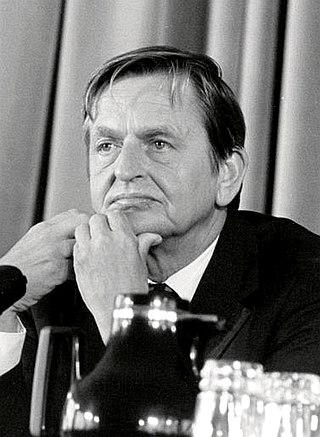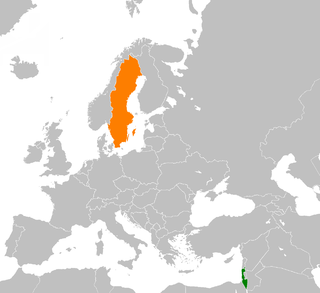
Sven Olof Joachim Palme was a Swedish politician and statesman who served as Prime Minister of Sweden from 1969 to 1976 and 1982 to 1986. Palme led the Swedish Social Democratic Party from 1969 until his assassination in 1986.

Gösta Ingvar Carlsson is a Swedish politician who twice served as Prime Minister of Sweden, first from 1986 to 1991 and again from 1994 to 1996. He was leader of the Swedish Social Democratic Party from 1986 to 1996. He is best known for leading Sweden into the European Union.

Tage Fritjof Erlander was a Swedish politician and statesman who served as the prime minister of Sweden and leader of the Social Democratic Party from 1946 to 1969. Previously, he served as minister of education from 1945 to 1946, and was a member of the Riksdag from 1932 to 1973. During his premiership, Sweden developed into one of the world's most advanced welfare states, with the "Swedish Model" at the peak of its acclaim and notoriety. His uninterrupted tenure of 23 years as head of the government is the longest ever in Sweden and in any modern Western democracy.

Ylva Anna Maria Lindh was a Swedish Social Democratic politician and lawyer who served as Minister for Foreign Affairs from 1998 until her death. She was also a Member of the Riksdag for Södermanland County until her assassination. On 10 September 2003, four days before a referendum on replacing the Swedish krona with the euro as currency, Lindh was stabbed by Mijailo Mijailović at the NK department store in central Stockholm; she died the next morning at Karolinska University Hospital. Anna Lindh had been seen as a likely candidate to succeed Göran Persson as Social Democratic party leader. Her greatest commitment was to international cooperation and solidarity, as well as to environmental issues. She worked on these issues throughout her career, serving as Environment Minister from 1994 to 1998, and then as Foreign Minister for the last five years of her life.

General elections were held in Sweden on 15 September 1985. The Swedish Social Democratic Party remained the largest party in the Riksdag, winning 159 of the 349 seats. Its leader, Olof Palme, kept his position as Prime Minister. He would retain this position successfully until his assassination in 1986.

Craig Michael Williamson, is a former officer in the South African Police, who was exposed as a spy and assassin for the Security Branch in 1980. Williamson was involved in a series of events involving state-sponsored terrorism. This included overseas bombings, burglaries, kidnappings, assassinations and propaganda during the apartheid era.

Anna Lisbeth Christina Palme was a Swedish children's psychologist, UNICEF chairwoman and the wife of Swedish prime minister Olof Palme, until his assassination in 1986.

On 28 February 1986, at 23:21 CET, Olof Palme, Prime Minister of Sweden, was fatally wounded by a single gunshot while walking home from a cinema with his wife Lisbeth Palme on the central Stockholm street Sveavägen. Lisbeth Palme was slightly wounded by a second shot. The couple did not have bodyguards with them.
Victor Gunnarsson was a Swedish right-wing extremist, who was a suspect in the 1986 assassination of Prime Minister Olof Palme. He emigrated to the United States, and was later murdered in 1993 in North Carolina by former police officer Lamont C. Underwood as part of a love triangle.

The deputy prime minister of Sweden is the deputy head of government of Sweden. The incumbent deputy prime minister is Ebba Busch.

The relations between Sweden and the United States reach back to the days of the American Revolutionary War. The Kingdom of Sweden was the first country not formally engaged in the conflict to recognize the United States before the Treaty of Paris. The Treaty of Amity and Commerce was signed subsequently in 1783 between Benjamin Franklin and Swedish representative Gustaf Philip Creutz.
The Ebbe Carlsson affair was a major political scandal in Sweden occurring during mid-1988. The affair came to public knowledge on 1 June 1988, when the evening newspaper Expressen revealed that Ebbe Carlsson, a journalist and publisher and former secretary at the Swedish government, was carrying out an independent and illegal investigation into the assassination of prime minister Olof Palme, secretly supported by the minister for justice Anna-Greta Leijon.

Israel–Sweden relations refers to the bilateral relations between Israel and Sweden. Israel has an embassy in Stockholm while Sweden has an embassy in Tel Aviv, and honorary consulates in Eilat and Haifa. The diplomatic relations between the two countries were briefly damaged when Sweden became the first member of the European Union to recognize the State of Palestine in 2014. Previously, other members had recognized Palestine, but that was before they joined the EU.
The first cabinet of Ingvar Carlsson was the cabinet of Sweden between 12 March 1986 and February 1990. The cabinet was formed as a direct consequence of the assassination of the incumbent prime minister Olof Palme on 28 February 1986. After which the Speaker of the Parliament, Ingemund Bengtsson, in accordance with the Constitution of Sweden discharged all ministers.

This article describes the history of Sweden from the late 1960s until 1991.
The third cabinet of Thorbjörn Fälldin was the cabinet and Government of Sweden from 22 May 1981 to 8 October 1982.
The cabinet of Ola Ullsten was the cabinet and Government of Sweden from 18 October 1978 to 12 October 1979.
Events from the year 1986 in Sweden
Kjell Larsson was a Swedish social democrat politician. He held many positions in the social democratic party and was one of the advisors to leading Swedish social democrats, namely Olof Palme and Ingvar Carlsson. He served as the minister of environment for two years between 1998 and 2000.
Sven Aspling was a Swedish social democrat politician who served as the general secretary of the Social Democratic Party and minister of health and social affairs. He was also a long-term member of the Swedish Parliament for the party.
This page is based on this
Wikipedia article Text is available under the
CC BY-SA 4.0 license; additional terms may apply.
Images, videos and audio are available under their respective licenses.











